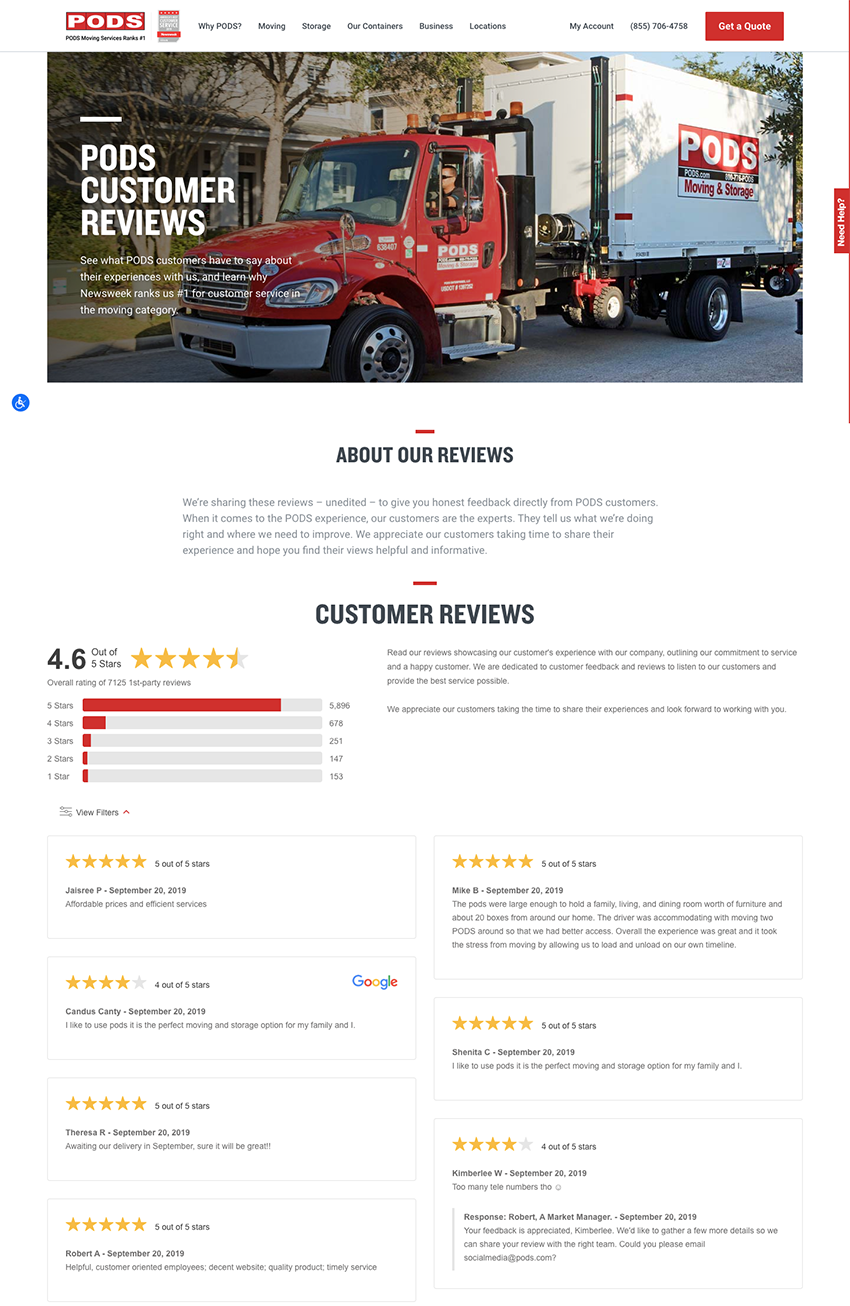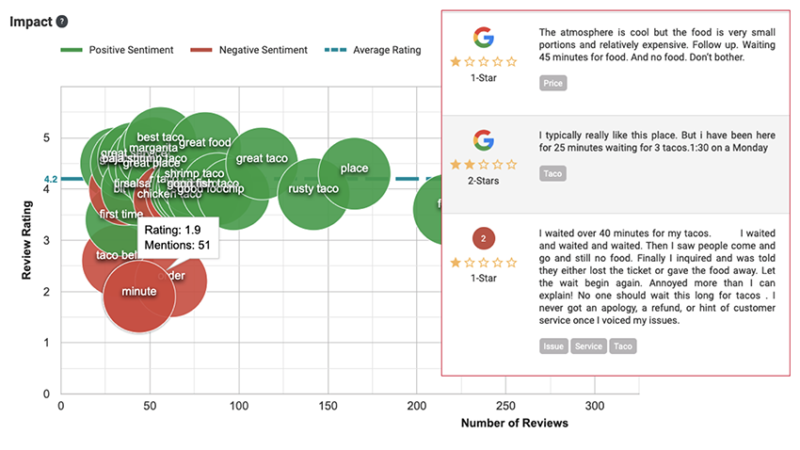Co-authored by Mike Blumenthal and Aaron Weiche
Last week Google announced they will now be ignoring schema related to 1st-party reviews. This change is frustrating for marketers but as we’ll get to later in this article, it doesn’t change their value.

While taking away the ability for a business’s own website to be able to display review stars in search results is disappointing, it was an overused (and sometimes abused) tactic whose demise was predictable.
The loss of review rich snippets is made all the more annoying by the fact that Google is really responsible for the mess in the first place. They not only encouraged their use but never clarified their guidelines nor put guard rails in to set limits. And they never enforced the limited guidelines that they did have.
Our quick take: Don’t throw out the donut just because it lost its sprinkles. 1st-party reviews still have a ton of value to your business and prospective customers.

What’s The Worst That Will Happen?
Google has made clear that this is NOT a penalty and you will NOT have a ranking issue if you display reviews with schema. A site can continue to use Local Business Review Schema and have no other impact than the loss of the gold stars in search results. You can read the FAQ here.
Google’s decision will do one thing and one thing only: remove star-ratings from your search results. This will likely reduce clickthrough from the results by 15-25% but that impact, if Google executes this ban correctly, will affect all equally.
The Snippets Are Gone, Now What?
We checked, the sky is not falling. When a tactic from your playbook disappears it’s time to review the strategy and make sure that other elements of your plan still make sense and provide value. And it’s time to consider new tactics to replace any small loss of traffic.
Do 1st-party Reviews Still Matter?
Absolutely.
We live in a world where there are fewer and fewer review sites. At an industry level, we have seen huge consolidation in the review space with many sites paling in comparison to the volume of reviews that Google now generates. Yelp has become a niche player and Facebook has deemphasized reviews. Neither generates much business from traditional discovery activities. Other niche vertical review sites get little traffic and send even fewer customers.
In a search world dominated by Google and where the bulk of customers conversions are happening on Google and your website, we think that 1st-party reviews are now even more important. Most users will only see reviews on Google and… on your website.
The Many Uses Of 1st-Party Reviews
It turns out that many customers are much, much more willing to give you a direct review than to give you a review at a public site like Google. At GatherUp, we see 1st-party reviews come in at a rate that is 3-10x higher than 3rd-party reviews. If you’re not asking for 1st-party reviews, you’re forgoing a huge amount of valuable information. Take advantage of these 1st-party review wins:
1. Knowing What Your Customer Thinks
Direct customer feedback can be used to improve your relationship with your customers and help solve real business problems. Your business can be alerted immediately of issues and in the aggregate, these details can help your business engage in continual improvement.
Knowing what your customer thinks far outweighs where that review ends up. Learn from your customers and protect your business from more bad reviews by fixing issues that are reported.
2. Create Fresh, Keyword Rich Website Content For SEO
Website content is one of the biggest challenges for most small business websites and 1st-party reviews are an easy solution. Often your customers can tell your brand story and details about your products or services better than you can.
And when they do it’s often sprinkled with SEO keywords and given at a far greater pace than you can update your website. Why not let them tell their stories on your website’s product and service pages? With Tags and Auto-Tagging from GatherUp, new reviews can automatically update page content when you use the Review Widget on your website.
3. Social Proof And Conversion
Putting your own review content close to your selling pages not only provides details about your products that would be hard to glean otherwise, but these reviews also provide significant value as social proof that gives your customers the confidence to do business with you.
Getting customers to your website is not an easy task. Make sure to convert the ones you land. Having your reviews, ratings, and content to help drive conversion is a must on your website to get customers to call, buy, fill out a lead form, or contact you.

4. Keyword Research And Ad Copy
What better way to know what your customers are looking for than by reading it in their own words? Whether you are looking for keyword ideas for your search campaign or just the right phrases for Ad words copy your first-party reviews can provide that information. This is easier to do when your review volume is greater and as we discussed above, you can have up to 10x more reviews when you ask your customers directly about their experience.
For GatherUp customers, the Insights Report does the work for you to discover and report the most frequently used keywords and phrases in your reviews.
5. Data Mining and Strategic Direction
Leveraging sentiment analysis, you can now identify what keeps your business from becoming that 5-star business that you think it should be. The details of a review often get lost in the star rating but by analyzing the content of your own reviews in aggregate you can start to see why customers leave a 1, 2 or 3-star review and learn how to make your 4-star reviewers into fanatical promoters.

Continual improvement is necessary in today’s business world and sentiment analysis can provide you with specific details to do just that.
Tactical Ideas To Succeed In Google’s Search Results
Reputation is still important in the search results. While you may have lost the ability to generate review stars in Google’s search results using your own website, you still have other ways of communicating your reputation in search.
1. Reputation In Your Title Tag

You have control over the meta title tag and can change it as we outline above to include your overall rating and review count. Especially if you are optimizing this title tag for a page dedicated to reviews you can also let the user know you are displaying all of your reviews in one place, offering them a lot of data and efficiency.
GatherUp customers would benefit here from showing all of their 1st- and 3rd-party reviews in the Review Widget.
2. Reputation In Your Meta Description

Similar to editing your title tag, edit your meta description to include your rating and review count. As seen above, this approach can add review info to a location page search result without losing valuable keywords in the title tag.
Keep Your Eye On The Ball
We live in a marketing world where marketing tactics come and go. As a business, it is important to not be distracted by the latest technique, hack, or buzzword nor be waylaid when that tactic no longer works.
Focus on building a better business and on making the customer the center of your world… then pick the tactics that help you get there.
Comments are closed.